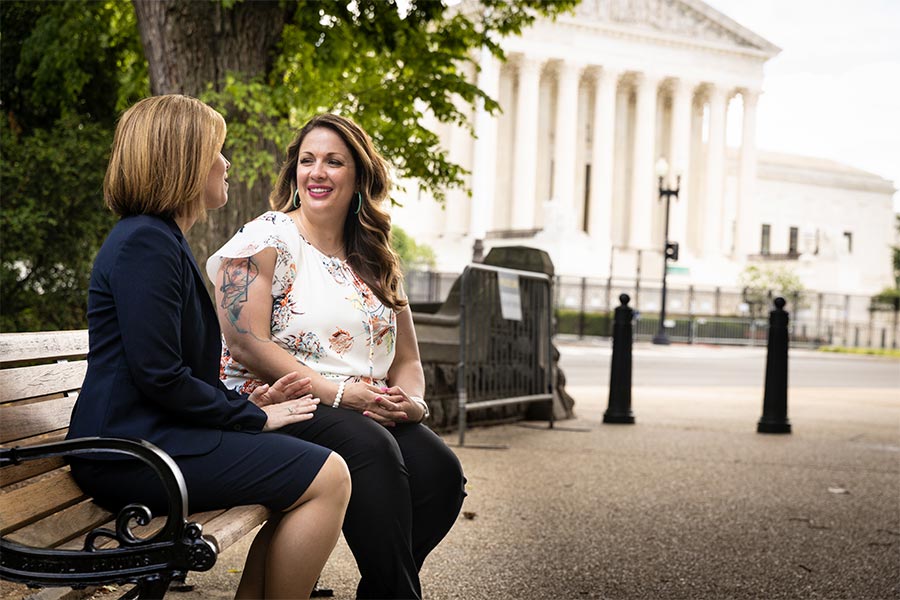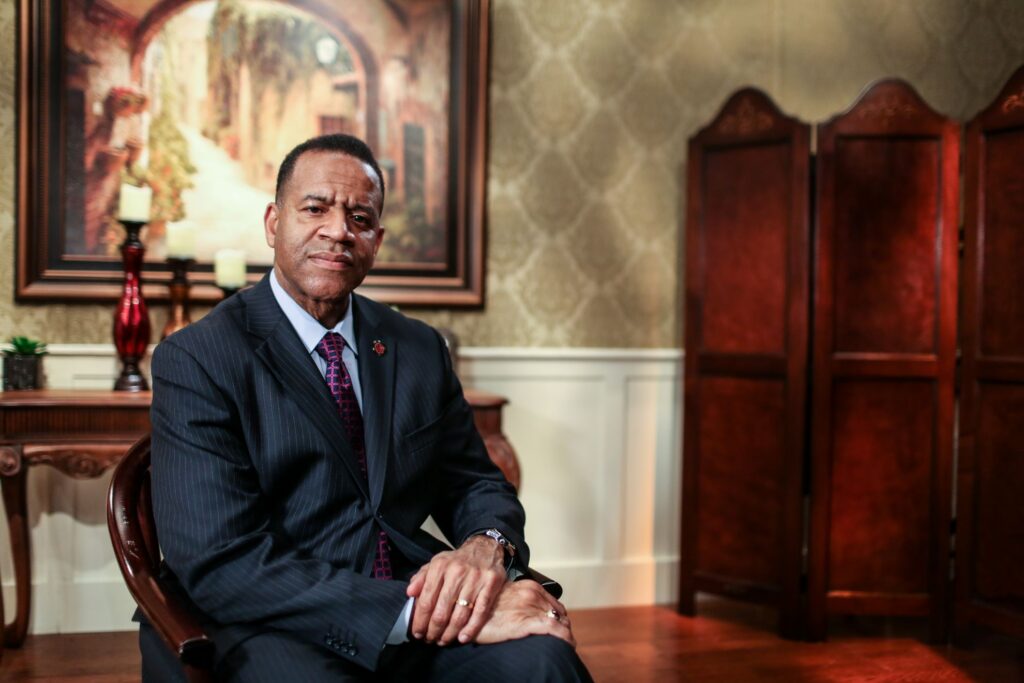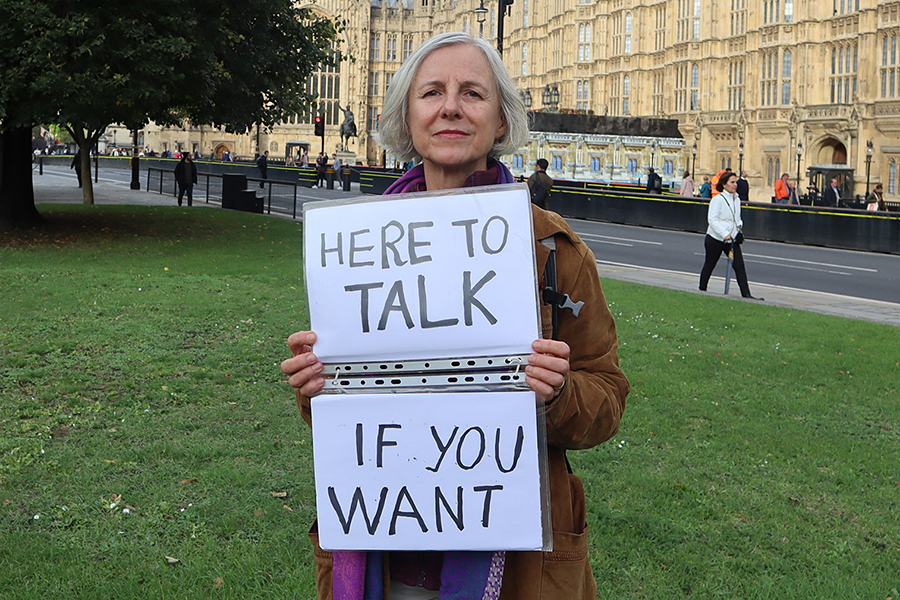
Free speech is for everyone—our opponents included. At Alliance Defending Freedom, we make strong arguments, and we draft strong briefs. And we expect our opponents to engage in healthy debate with our beliefs and our arguments. Strong disagreement about big questions is a feature of free speech, not a bug.
In fact, that’s part of the reason ADF exists. Our mission is to defend everyone’s right to live and speak the truth. Unfortunately, not everyone sees free speech that way, and some use their freedom to slander and misrepresent those they disagree with.
In the days leading up to our victory in the landmark U.S. Supreme Court case 303 Creative v. Elenis, some chose to invent ugly untruths about our organization and our case.
But the answer to these untruths isn’t silence; it’s more speech. When ADF and our clients are slandered, we will respond. So in the spirit of speaking freely, let’s address a viral falsehood head-on.
What was the claim?
The day before the Supreme Court issued its decision in 303 Creative, a left-wing magazine called The New Republic published an article suggesting that “it looks like [ADF client Lorie] Smith and her attorneys have, perhaps unwittingly, invented a gay couple in need of a wedding website.”
The claim comes from an inquiry that Lorie received on her website in September 2016 (the day after she filed her lawsuit) from someone who self-identified as “Stewart.” This person requested Lorie design custom graphics for a same-sex wedding. Lorie did not respond to the inquiry because Colorado could punish her if she responded. In fact, the Colorado law even made it illegal for Lorie “directly or indirectly, to publish … any … communication” saying she could not create websites celebrating same-sex weddings.
Years later, the magazine decided to reach out to “Stewart” using the contact information found in our legal brief. The man said he had never submitted the form. In other words, The New Republic implied, we had fabricated the request.
That is false. To repeat it is a lie. And it would have been nonsensical to have manufactured the request in the first place.
As a liberal Supreme Court commentator, no fan of the case, said:
“There is no evidence whatsoever that either 303 Creative or ADF (its counsel) fabricated the fake request. The allegation makes no sense. Why fabricate the request after, rather than before, the complaint is filed? And why make the fraud so easy to detect?”
What the magazine didn’t consider was the far more likely scenario: that Stewart (or someone using his contact information) did submit the request. For context, Stewart is a web designer and former CNN employee who called the Supreme Court’s decision “disgraceful.” But all these facts were inconvenient to the intended smear of ADF and our client by The New Republic.
After that article was published, a major newspaper decided to add fuel to the fire by going a step further, claiming “the veracity of a key document” in the case was in question. “Key document may be fake” read the headline. And the media smears continued after that, with powerful voices in law and government stoking the flames of misinformation.
THREAD: @newrepublic‘s last-minute attempt to malign Lorie smacks of desperation to delegitimize her civil rights case and our judicial system. https://twitter.com/newrepublic/status/1674557112171606016
— Kellie Fiedorek (@ADFKellie) June 29, 2023
What actually happened?
On Sept. 20, 2016, we filed our federal lawsuit on behalf of Lorie Smith, a graphic artist who designs custom websites. Lorie’s case was a pre-enforcement challenge, meaning we were challenging the law before it was used to punish Lorie.
Pre-enforcement challenges like Lorie’s are common, they’re a hallmark of civil-rights litigation, and they’re an essential part of our judicial system. No one should have to wait to be punished before challenging an unjust law.
What’s more, every one of the 12 appellate judges who looked at the case agreed that Lorie had standing to bring the lawsuit. None of their opinions even considered whether Lorie had received a request to design a same-sex wedding website.
And no one disputes that Lorie did in fact receive the request—on Sept. 21, the day after she filed the case. That alone should put any “controversy” to rest. But, again, what makes these baseless attacks even more laughable is that we had no reason to fabricate a request. Again, Lorie’s lawsuit was a pre-enforcement challenge; she would have had standing regardless of whether she had received any request. Her speech was being chilled by Colorado’s law.
Furthermore, Lorie’s case was not just any pre-enforcement challenge; it was a particularly strong one. To establish standing, Lorie simply had to show that she faced a “credible threat” of enforcement from Colorado if she designed websites consistent with her beliefs.
The case of Jack Phillips, another ADF client, illustrates just how credible those threats are. Jack has now been in litigation for over a decade. Colorado first prosecuted him after he declined to design a custom cake for a same-sex wedding. On the very day the Supreme Court announced it would hear his case, an activist attorney called Jack requesting a cake to celebrate a “gender transition.” After Jack politely declined that request, the state began another round of enforcement proceedings against him.
Lorie saw how aggressive Colorado has been in enforcing its law, so she decided to file a lawsuit to protect not just her free speech, but the free speech of every American. And both the appellate court and the Supreme Court agreed that she had standing to bring the suit. “The Appellants are rightfully wary of offering wedding-related services and may challenge CADA as chilling their speech,” the appellate court ruled.
What’s the big deal?
Had the misinformation about 303 Creative been confined to anonymous Twitter users and Reddit trolls, it wouldn’t have been worth our time to respond.
But these mistruths were peddled by those who have a responsibility and obligation to report honestly.
They came from one source—the New Republic article—and only snowballed from there.
In the days following the Supreme Court’s decision, we’ve seen the Colorado attorney general, former White House staff, prominent attorneys (who should, and likely do, know better), and even one Cabinet member shamefully spread the lies about our case.
Americans should ignore this manufactured outrage.
303 Creative v. Elenis was a victory for the free speech rights of every citizen of this country, which the Supreme Court repeatedly stressed in its majority opinion.
“A commitment to speech for only some messages and some persons is no commitment at all,” the majority wrote.
In another passage, the Court added: “The First Amendment envisions the United States as a rich and complex place where all persons are free to think and speak as they wish, not as the government demands.”
By allowing all views to flourish, the framers understood, we may test and improve our own thinking both as individuals and as a Nation.
Put even more concisely, the answer to false speech is more speech. Free speech allows for the pursuit of truth. And truth is powerful. Truth prevails, and ADF will continue to stand for everyone’s ability to live it and speak it.
Hear more about this landmark victory from ADF President, CEO, and General Counsel Kristen Waggoner, who argued the case before the Supreme Court.






